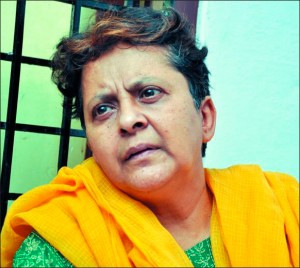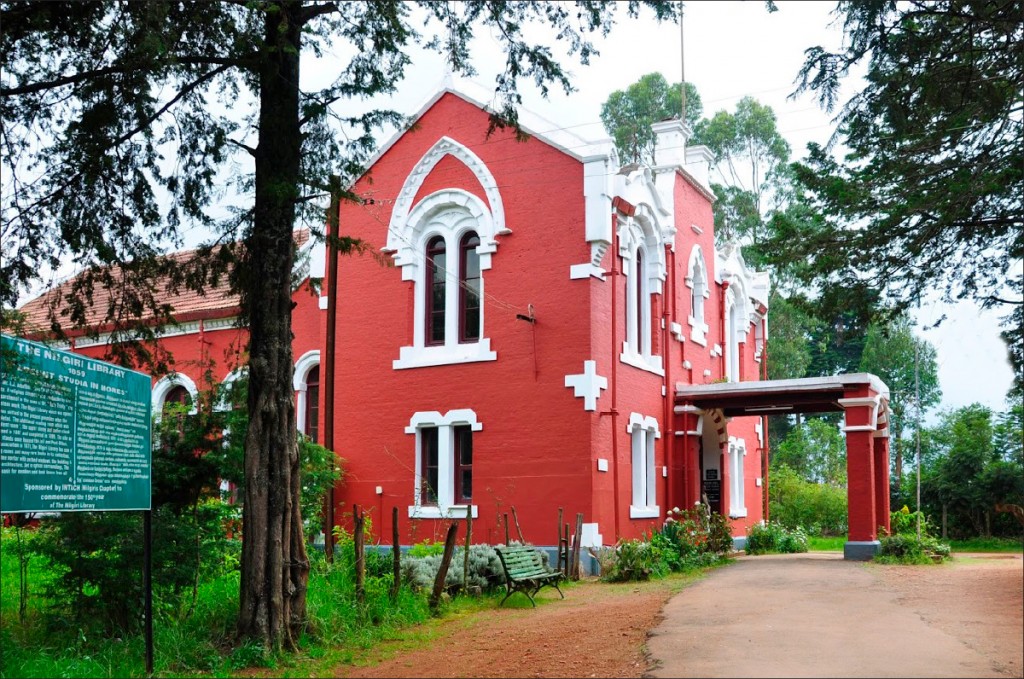

I am not a writer. I don’t know why I am here.’ That’s how Gita Ramaswamy began her conversation onstage. At the end of the session, she received a standing ovation from the audience. She, clearly, was the star of this year’s edition of the Ooty Literary Festival (OLF) held over September 9 and 10 at the colonial, Gothic-style Nilgiri Library, around since about 1869. What she was clarifying was that her legitimate job description was editor and publisher of the Hyderabad Book Trust (HBT) that since 1980 has been making available to readers scores of affordably priced books originally in and translated into Telugu. However, she was at Ooty not just because of her HBT connection, but more because of the book she had written, Land, Guns, Caste, Woman.
Land, Guns, Caste, Woman. This loaded title was primarily the reason I picked up the book at my local bookstore. That, and the tagline: The Memoir of a Lapsed Revolutionary. I did not know who Gita Ramaswamy was but the moment I started reading — which was at once — I was hooked: ‘This is the story of my reckoning with myself and the world around me. I was born into a Tamil Brahmin family with roots in Kerala. For over five decades, the rugged Deccan landscape of Hyderabad and its surrounding districts has been my home. While burning the bra was considered radical in the West, in my family, wearing one when I was fourteen made me a slut. My younger days were marked by small insurrections and a passion for mathematics. I gravitated towards the Naxalite movement in the 1970s and went underground during the Emergency. My parents thought I had been brainwashed.’
First estranged from her family, then disillusioned by the movement, Gita Ramaswamy says HBT ‘worked like a drug against my depression. I soon became the face of HBT and I still am. Yet I could not settle into this role. The revolution I lived for and dreamt of was still not at hand. I was restless. I was thirty.’ Her life’s course changed once again when, in 1984, she went to Ibrahimpatnam, southwest of Hyderabad, and met people from Dalit communities crushed within the tentacles of feudalism and landlessness. There she discovered her purpose and for the next ten years traversed the villages in the region, fearlessly and successfully leading land struggles through legal means, and moving against bonded labour.
‘They accepted me and gave me so much love,’ says Gita when asked how she coped not just with a life radically different from that of a ‘savarna’, a Brahmin, but with the circumstances. ‘I could not but return that love.’ The Reddy landlords, she writes, ‘pressed huge stones on the backs of people for hours as “punishment”; in some villages, newly-wed madiga brides were first brought to the dora’s gadi for their ‘breaking in’; the breasts of lactating women labourers were pressed to check if they really needed to feed their infants… such stories abound in each village among the poor and the dalits.’ It’s not hard to imagine that given the kind of work she was involved in, her own life was often in danger. Written simply, transparently, and in great detail after much reflection, Land, Guns, Caste, Woman opened my eyes to many realities in India that we either do not know about or, more possibly, choose to ignore.
Now, Gita Ramaswamy’s work is entirely focused on HBT which, after some years of regularly publishing a range of titles, was badly hit during the pandemic and is struggling to find its feet once more. In an interaction on the subject of small, independent publishers with writer Jerry Pinto on the second day, she said she was keen to publish an anthology of writings of Adivasis from the two Telugu-speaking states, but sourcing funds for the project was posing a challenge. “In two years, you will launch this book at this very venue,” said Jerry as he set off an on-the-spot crowdsourcing drive by committing ₹25,000 himself. Hands in the gathering went up swiftly and, in a matter of minutes, a five-figure amount was totted up, much of it in cash.
Down-to-earth and inspiring in an entirely different way was Shobha De, who had read out a very small bit from her book Seventy… and to hell with it at dinner the night before. It’s not surprising that her session drew the biggest crowd as she recounted and regaled, all the while taking her listeners seriously. The public persona and woman inside seemed to cohabit comfortably, she seemed to know and respect who she was, and all that she shared came across as genuine and heartfelt. Nor did she fuss when people clamoured for selfies.
Shobha De says she’s been journalling since age 12, and although she never ‘dreamt’ of being a writer, clearly her observations of life and people and the experiences she’s had inspired the many books she’s written, including those she’s produced to mark the many decades of her life. It’s impossible to believe she will be 75 — yes — in January and she’s planned something for that as well, including an Elvis party: ‘I love Elvis!’ Her advice to women? Be economically independent, never have a joint account, be in charge of your own money.

Which brings us to The Education of Yuri. “This book is going to win the Booker!” Arthy Muthanna Singh, the warm-hearted, jabberwocky coordinator of the OLF didn’t tire of repeating. Luckily for us, Jerry Pinto — the same — usually always carries copies of his books for eager beavers like myself to buy — at a discount, always — and sign. Speaking about the book which has only just been published, he said he wished readers would want the book not to end… like there are some books that are so wonderful to read that when you get close to the end you keep checking to see how many more pages remain and you slow down the pace of reading so the book lasts longer. Well, I have just started reading the book, and I’m already reading it slowly so that it lasts really, really long. It’s that absorbing.
Some of you may have read his brilliant Em and the Big Hoom. If you haven’t. please do. By the way, when you come to know that he was commissioned to write Surviving Women to twin with Shobha De’s Surviving Men, you see the range of his writing Jerry Pinto offers, apart from being a walking talking encyclopaedia. His sister Andrea is one too.
One last thing, about the OLF. It was started in 2015, the brainchild of a longtime resident of the Nilgiris, Yash Muthanna. Even as she broke the news to her family, she bumped into a fellow longtime resident, Geetha Srinivasan on the steps of the library and thereby hangs a tale. The OLF has now seen seven editions. The founders’ closeness to nature is reflected in trees of various heights planted as saplings by various individuals recognised by the OLF for their contributions to literature. This year’s awardee was Gita Wolf, the founder of Tara Books. Although affectionately referred to as the ‘grandmas who started the OLF’, Yash Muthanna and Geetha Srinivasan are hardly typically ‘grandmothorial’ in their limitless energy and enthusiasm. They are an inspiration on how to keep growing — gracefully, creatively, actively and hospitably.
The columnist is a children’s writer and senior journalist






